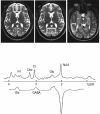Cortical gamma-aminobutyric acid and glutamate in posttraumatic stress disorder and their relationships to self-reported sleep quality
- PMID: 24790267
- PMCID: PMC3985106
- DOI: 10.5665/sleep.3654
Cortical gamma-aminobutyric acid and glutamate in posttraumatic stress disorder and their relationships to self-reported sleep quality
Abstract
Study objectives: To test if posttraumatic stress disorder (PTSD) is associated with low brain gamma-aminobutyric acid (GABA) levels and if reduced GABA is mediated by poor sleep quality.
Design: Laboratory study using in vivo proton magnetic resonance spectroscopy (1H MRS) and behavioral testing.
Setting: VA Medical Center Research Service, Psychiatry and Radiology.
Patients or participants: Twenty-seven patients with PTSD (PTSD+) and 18 trauma-exposed controls without PTSD (PTSD-), recruited from United States Army reservists, Army National Guard, and mental health clinics.
Interventions: None.
Measurements and results: 1H MRS at 4 Tesla yielded spectra from three cortical brain regions. In parieto-occipital and temporal cortices, PTSD+ had lower GABA concentrations than PTSD-. As expected, PTSD+ had higher depressive and anxiety symptom scores and a higher Insomnia Severity Index (ISI) score. Higher ISI correlated with lower GABA and higher glutamate levels in parieto-occipital cortex and tended to correlate with lower GABA in the anterior cingulate. The relationship between parieto-occipital GABA and PTSD diagnosis was fully mediated through insomnia severity. Lower N-acetylaspartate and glutamate concentrations in the anterior cingulate cortex correlated with higher arousal scores, whereas depressive and anxiety symptoms did generally not influence metabolite concentrations.
Conclusions: Low brain gamma-aminobutyric acid (GABA) concentration in posttraumatic stress disorder (PTSD) is consistent with most findings in panic and social anxiety disorders. Low GABA associated with poor sleep quality is consistent with the hyperarousal theory of both primary insomnia and PTSD. Our data demonstrate that poor sleep quality mediates low parieto-occipital GABA in PTSD. The findings have implications for PTSD treatment approaches.
Keywords: GABA; brain; glutamate; magnetic resonance spectroscopy; posttraumatic stress disorder; sleep.
Figures


References
-
- Charney DS. Psychobiological mechanisms of resilience and vulnerability: implications for successful adaptation to extreme stress. Am J Psychiatry. 2004;161:195–216. - PubMed
-
- Hageman I, Andersen HS, Jorgensen MB. Post-traumatic stress disorder: a review of psychobiology and pharmacotherapy. Acta Psychiatr Scand. 2001;104:411–22. - PubMed
-
- Vaiva G, Thomas P, Ducrocq F, et al. Low posttrauma GABA plasma levels as a predictive factor in the development of acute posttraumatic stress disorder. Biol Psychiatry. 2004;55:250–4. - PubMed
-
- Krystal J, Sanacora G, Blumberg H, et al. Glutamate and GABA systems as targets for novel antidepressant and mood-stabilizing treatments. Mol Psychiatry. 2002;7:S71–80. - PubMed
Publication types
MeSH terms
Substances
Grants and funding
LinkOut - more resources
Full Text Sources
Other Literature Sources
Medical
Research Materials

